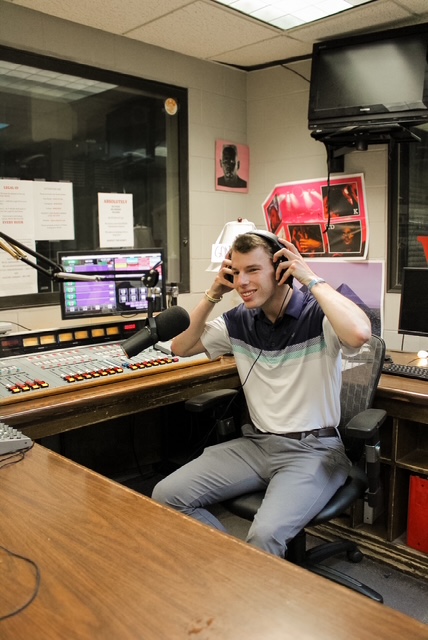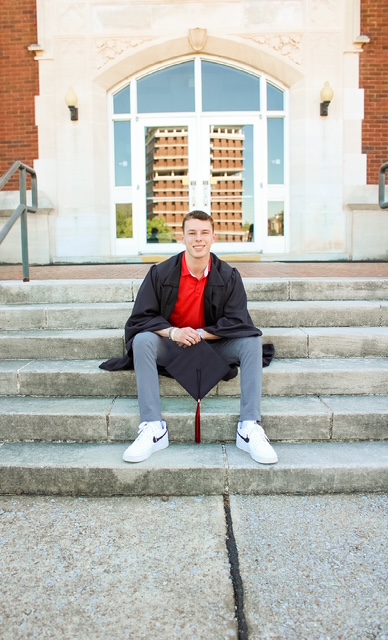‘I’ll never take things for granted’
06/20/2025
Recent Jax State graduate reflects on how a childhood medical emergency shaped his life
By Brett Buckner
 By the time he reached high school, Hayden Coker had overcome enough obstacles to last a lifetime. Yet, his list of milestones continues to grow. In May, the 22-year-old Coker received his BA in communications from Jax State, making him the first in his family to graduate from college. "It feels good … so good," the Ashville native said. "I'm happy to be done."
By the time he reached high school, Hayden Coker had overcome enough obstacles to last a lifetime. Yet, his list of milestones continues to grow. In May, the 22-year-old Coker received his BA in communications from Jax State, making him the first in his family to graduate from college. "It feels good … so good," the Ashville native said. "I'm happy to be done."
Coker's mother, Robin Cash, was proud and overwhelmed by her son's accomplishments. "He's an extraordinary person," she said. "He has a huge, huge heart, and he loves everybody, and he just wants that love returned."
With his diploma, Coker can pursue his long-time dream of becoming a sportscaster and sports radio host. He has sharpened his chops, calling Gamecock baseball and softball games and hosting his own campus radio show.
"It just came from a desire when I was younger to have that safe space," Coker said. "Whenever I would watch sports or be involved in some sports in some capacity, I just kind of felt like I was at home."
Inspired by sports talk personalities like Chris "Mad Dog" Russo and Pat McAfee, Coker has already envisioned the path for his future career. "I want to start out small, to mold my game to be the best it can possibly be and just let my talent show from there," he said. "Then, in the next 10 to 15 years, I'd like to be somewhere with a sports radio show - sorta doing it in my own, unique way. I'm just ready to get started."
Perhaps more than any other student who crossed the stage at spring commencement, Hayden Coker appreciated how far he'd come and how fortunate he was to be there. "I've learned a lot about myself," he said. "Because of the stuff I've been through, I'll never take things for granted."
Coker was in third grade when an MRI revealed he had a brain tumor the size of a tangerine, a diagnosis that demanded multiple surgeries, physical therapy, speech therapy, dramatic weight loss and looming fear that the "old Hayden" was gone forever.
It started with a headache
 Coker was a vibrant child who loved sports, often watching – in truth, studying – 10-year-old college football games. At four years old, he already knew the lingo. His mother, Robin Cash, remembers throwing the football with her son when he'd shout, "Go for the Hail Mary!" leaving her mostly clueless. "He was wild, to say the least," Cash said. "He was on the go all the time, never slowing down, and he loved sports, especially football."
Coker was a vibrant child who loved sports, often watching – in truth, studying – 10-year-old college football games. At four years old, he already knew the lingo. His mother, Robin Cash, remembers throwing the football with her son when he'd shout, "Go for the Hail Mary!" leaving her mostly clueless. "He was wild, to say the least," Cash said. "He was on the go all the time, never slowing down, and he loved sports, especially football."
Coker was 8 years old, having returned home from a trip with his cousin when he first complained of a headache. Cash didn't think too much about it at first but did mention it to the family pediatrician during her son's yearly checkup in June. The doctor was equally unconcerned but added a warning. "He said, 'You call me if he has a headache in the middle of the night and is throwing up.'" Cash said. "That was kinda it."
But it was only the beginning. On August 19, Coker woke up at two o'clock in the morning throwing up. That's when his mother grew concerned. Her son, not so much. "He was like, 'Oh, I'm fine,'" Cash said. "Then I just remember him kind of walking away." Cash returned to fixing breakfast for her other son. She eventually walked back into the bathroom where he was getting ready for school and asked if he had a headache. Again, Coker was dismissive. "It's not a big deal," he said.
Coker convinced his mother to let him go to school, where he'd just started the third grade. The headache only got worse. "I told the teacher about it," Coker said. "She was kinda frustrated at the time because it was in the middle of class. But she let me go to the nurse." Coker called his mom to come pick him up. Cash immediately called the pediatrician who told her to take her son to Children's South Pediatric Hospital for a CT scan.
On August 23, the pediatrician called Cash with the results. "I was literally walking up the back steps with a pumpkin in my hands," Cash remembers. "I was babysitting for the day, so I had three kids with me. When I got the news, I just dropped to my knees, like, 'What am I going to do?'" The real question was, how does a mother tell her 8-year-old son he has a brain tumor?
"We tried to put it in the simplest terms as we could," Cash said. We didn't want to lie to him. We told him exactly what they found, and we're going into the hospital to fix it. And we tried to make it the least amount scary as we possibly could. But of course, we were all terrified because immediately we thought cancer."
That was on a Thursday, by Friday morning he was admitted to Children's Hospital, and on Monday he had surgery to remove the tumor, which was benign. "I think it took like eight and a half to nine hours for the surgery," Cash said. "But afterwards, he wasn't right." Call it mother's intuition, but Cash knew something was wrong with her son. Initially, the neurologist "who was amazing," Cash said, attributed Coker's recovery to the size of the tumor. "He said that basically, Hayden's brain was collapsing in on itself and it was like mush," Cash said. "He's not going to be able to walk or talk for a while. But still … I just knew that was not Hayden. That is not my kid."
Cash was persistent and insisted something was wrong. Additional tests proved that she was right. Spinal fluid was building up on his brain. The neurologist scheduled a second surgery, this time to puncture a small hole in the top of his skull to allow the fluid to escape. After the procedure, Coker was in the PICU for four days. "Immediately when he came out of that surgery, he was different," Cash said. "He was back to my son. Coker's road to recovery would be long. He basically had to learn how to walk and talk all over again, spending months in physical, occupational, and speech therapy.
Yet, somehow, that wasn't the worst part. "It was rough," she said. "He was throwing up like 14 or 15 times a day." After the surgery, Coker was down to weighing roughly 45 pounds. Coker couldn't keep any food down. Though the doctors assured her it was all a part of his recovery, it was painful for a mother to watch her son continually struggle.
"I would have to pull off on the side of the road for him to throw up on the way to Birmingham for therapy," she said. "I would just be bawling my eyes out. I didn't want him to throw up and be sick. It was just exhausting."
The recovery was hard physically, but the mental aspect was harder for Coker to understand. "It was like, why can't I do these things anymore that I used to do without thinking," he said. "I just wanted to be normal again."
But Cash didn’t hold the family together all by herself. Coker’s father, James Coker, played a vital role as well. “He went to work and kept my brother, along with my grandmother, while my mother was always at the hospital,” Hayden Coker said.
Because he was so young, Coker's memories are more like snapshots. One that sticks out is when he and his mother went to Mo's Original BBQ in Birmingham, and she was trying to navigate the restaurant with him in a wheelchair. "She's struggling because she doesn't really have any hands," Coker said. "She's wheeling me around and nobody wants to stop to help her. I just remember her telling me how that really upset her. That was one of the saddest moments … for me at least."
Coker believes it wasn't until ninth or 10th grade that he felt normal again. But some things would never fully return. "My hand-eye coordination is terrible," he said, laughing. "I joke about having the hand-eye coordination and the balance of a toddler. It's just something I've learned to live with … but considering everything, that's not so bad."

